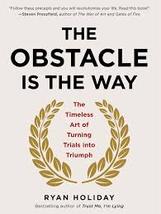 I'm a huge fan of Ryan Holiday's reading recommendations newsletter and his first book, Trust Me, I'm Lying. I was very excited to read his more philosophical third book, The Obstacle is the Way: The Timeless Art of Turning Trials into Triumph, and it turned out to be extremely easy to read, concise, and impactful. Ryan uses his extensive research and reading experience to relate a large number of episodes where historical figures used the strategies of Stoicism to overcome the obstacles they faced. They didn't just overcome their obstacles; they used them to grow stronger and turned them to their advantage. For me this was the coolest takeaway of the book: that it can be (and probably should be) the obstacle that becomes the point of advantage and the source for creative solutions. I was struck by how many successful and pivotal historical figures, like emperors, presidents, inventors, and entrepreneurs explicitly cited Stoicism as their major philosophy. There is a Russian proverb that came to mind when I read the book: "The smart one won't go into the mountain but will go around the mountain." In some ways this is supported by Ryan's book in terms of learning from one's mistakes and trying every possible solution to get to one's goal; in other ways, it is different from what Ryan teaches because many of the lessons in this book recommend specifically finding ways to lean into and flip upside down the obstacles in one's path so they become strengths. These two types of advice are often hard to reconcile: some books recommend building up your strengths and focusing on your core competencies and passions, while other books recommend addressing your weaknesses and working hard to turn them into strengths. Even Ryan's book had lessons supporting both points of view, where some historical figures really reinvented themselves to address their weaknesses and others just focused on what they were good at. Ryan even touched on a similar point when he mentioned that there is this balancing act between persisting and banging on solutions that aren't working on the one hand and learning from one's mistakes and trying totally different things on the other. It's also not unrelated to the perennial pivot vs. persevere choice facing lean startups each time around the Build-Measure-Learn cycle. Overall, I found the major ideas of Stoicism and the general attitudes of appreciating what you have, remembering your mortality, accepting what happens and making the most of it, and looking for the positive whenever you can to really resonate with how I view the world already. I found the book to be enlightening, thought provoking, easy to read, and lots of fun. I now feel really inspired to delve deeper into some of the primary Stoic texts and see how to integrate this philosophy into my own life even more. Tim Ferriss, author of the 4-Hour Workweek, did an excellent interview with Ryan recently as well, which I recommend you check out if you want to learn more.
1 Comment
Mark
12/18/2015 05:54:13 am
Thanks for publishing these. I'm doing the audio book in the car and am not able to take notes while driving. I didn't expect it to be such a good book. Cheers.
Reply
Your comment will be posted after it is approved.
Leave a Reply. |
Archives
June 2024
Categories
All
Subscribe |
 RSS Feed
RSS Feed
